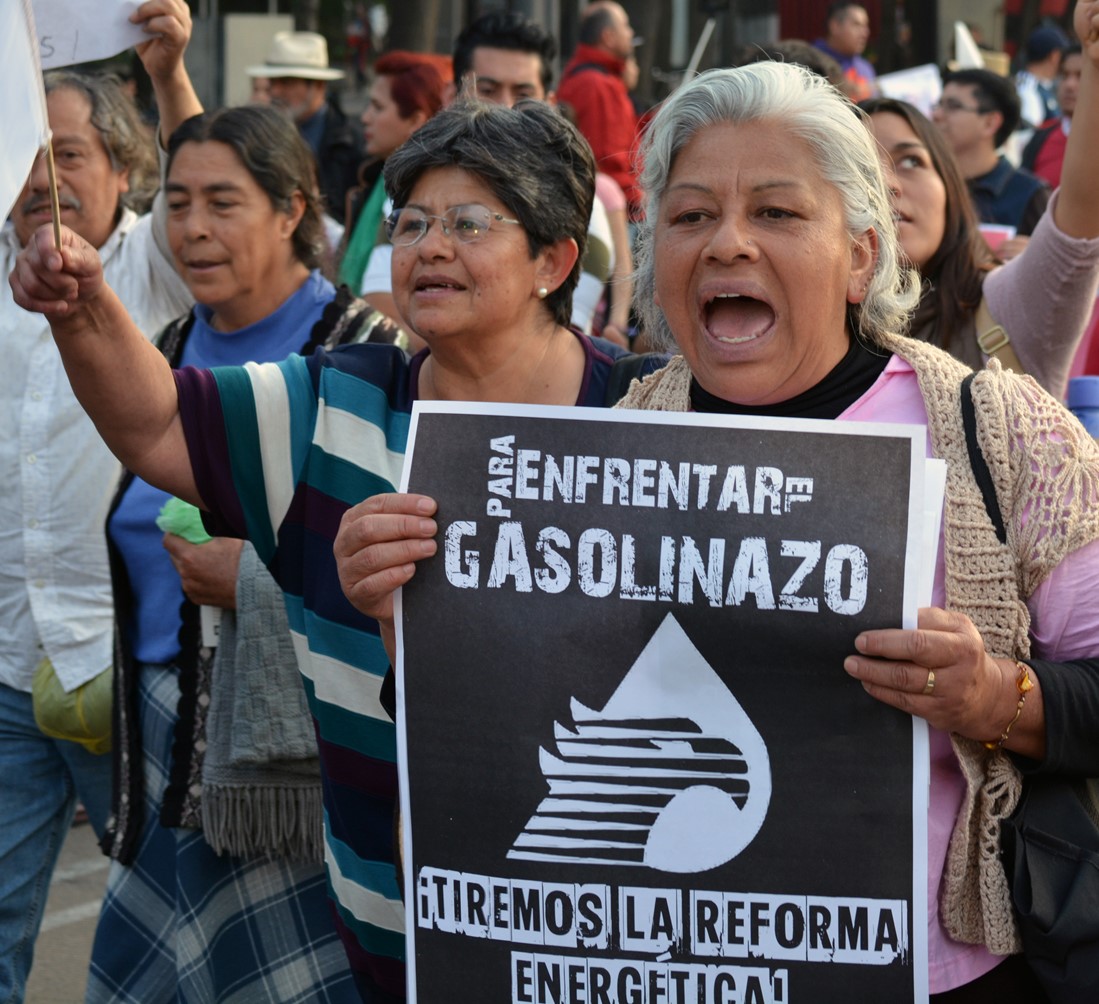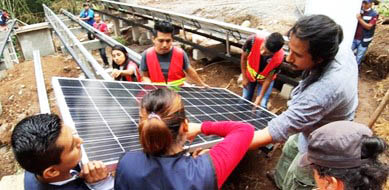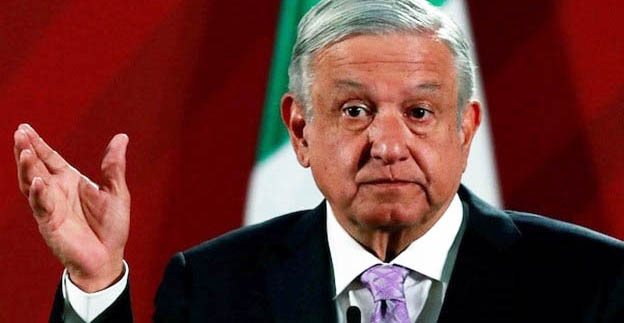|
|
|
|
The weekly newsletter of the México Solidarity Project |
|
|
|
November 24, 2021/ This week's issue/ Meizhu Lui, for the editorial team |
|
|
Big Oil: Plundering Our Floundering Planet |
|
Getty gas stations used to dot the US countryside, and an admirer of J. Paul Getty, the founder of Getty Oil, once asked the billionaire to share his secret for getting rich. Old J. Paul’s response: “Get up early. Work hard. Find oil.”
That answer, of course, begs another question: How do you get the right to own the oil you find? No oil tycoon, we need to remember, ever made any oil. Natural processes created oil over the course of millions of years, long before the evolution of the human species — and long before the invention of private property. Why should any one private person be able to lay claim to oil wealth?
Indigenous peoples the world over are asking that question. Oil has been sitting underneath them forever, but you don’t see individual members of tribal nations claiming private ownership of land parcels or owning villas in Italy or oil fields in Saudi Arabia. Where indigenous people see land as an ecosystem capable of sustaining many forms of life, J.Paul Getty, his fellow capitalists, and their governments have only seen dollars.
In the United States, Native American land was taken by force and distributed to Anglo settlers. J. Paul’s father bought some of that land in Oklahoma and struck oil, the start of the Getty empire. In México, governments gave foreign investors the right to extract the “black gold” from under their soil as long as they got their cut.
México today, Kurt Hackbarth notes in this week’s interview, can do more than claim control over its energy sector. It can allow indigenous people to control their natural resources at the local level. In the age of oil, the future lay under us. Today, that future depends on leaving our “black gold” under the ground. |
|
|
|
Don’t miss an issue. Subscribe to the weekly México Solidarity Bulletin! |
|
|
|
|
The writer, playwright, and freelance journalist Kurt Hackbarth analyzes Mexican politics from a left perspective, providing a welcome antidote to the “news” we read in the mainstream US and Mexican media. A naturalized Mexican citizen born in the United States, Hackbarth writes in both English and Spanish. He’s currently coauthoring a book on the 2018 Mexican election. His most recent article, a look at México’s far-right, appears in the Jacobin magazine.
Everyone in México needs to turn on their lights, drive their cars, and plug in their cellphones. What sort of energy resources can México tap? |
|
|
Kurt Hackbarth: México is blessed — or cursed — with an abundance of oil and gas. New oil fields have been discovered just in the past few years. México also has one of the world’s largest deposits of lithium, “the new oil,” an element essential to the production of everything from batteries and computers to cars and pacemakers. México has other strategic minerals as well.
In México’s southeast, hydroelectric dams can provide enough energy for the whole region. The Isthmus of Tehuantepec offers one of the world’s most promising areas for wind power. And the government is now making investments in solar, with a large windfarm project in Sonora and an urban solar installation in México City.
Let’s focus on oil. Given its abundance in México, do the Mexican people have what they need at an affordable price?
Foreign oil companies gained an early foothold in México. But President Cárdenas nationalized the oil sector in 1938 and created Pemex, a publicly owned and operated entity. This move enjoyed huge support from the Mexican people and still remains a point of national pride.
But Mexico’s neoliberal governments have since then deliberately sabotaged Pemex. The Pemex CEO from 2012 through 2018, Emilio Lozoya, has even been charged with organized criminal activity. Before heading Pemex, Lozoya served as former Mexican President Enrique Peña Nieto’s campaign manager. Prosecutors are charging him with accepting millions from the Brazilian construction and petrochemical giant Odebrecht. In return for pay-offs, Odebrecht won lucrative contracts. Lozoya’s now in pre-trial detention, a poster boy for the corruption that AMLO has vowed to fight. |
|
The sabotage also included raids on Pemex funding and a refusal to do adequate refinery upkeep. This entire mess became the excuse for privatizing Pemex. In 2013, President Peña Nieto welcomed foreign companies back, opening up the entire industry. The resulting leeching of resources required the raising of gasoline taxes — called gasolinazos in the press — to plug the Pemex budget hole. Under Peña Nieto, the price of gas at the pump jumped up by more than a third. This triggered mass protests on a number of occasions. |
|
|
ProtoplasmaKid / Wikimedia Commons / CC-BY-SA 4.0 |
|
AMLO wants to bring back national/public control. What’s the current situation?
AMLO has made valiant attempts to get Pemex in order. He has repaired six refineries and is building a new refinery, Dos Bocas, in Tabasco. AMLO’s administration has also refurbished hydroelectric stations, and his new constitutional reform proposes to nationalize the lithium industry while strengthening the role of the Federal Electricity Commission. A key legislative vote on these reforms will likely take place before Christmas.
But isn’t AMLO also going to increase fossil fuel production to the detriment of attempts to restrain global warming?
We’ve seen an international attempt to paint AMLO as a lover of dirty energy. His opponents are trying to build opposition from environmentalists to Mexico’s nationalization of its energy sector. But all this amounts to a public-relations scam. Don’t fall for claims that US and European energy interests represent “green energy” while México represents fossil fuels!
Biden’s stance here has actually been even more interventionist than Trump’s. His ambassador to México, Ken Salazar, is acting as a shill for US energy interests and engaging in unseemly meddling in Mexico’s internal affairs — by publicly lobbying against AMLO’s energy reform. And, by the way, the reform wouldn’t amount to a complete “nationalization.” Some 54 percent of energy going into the grid would be from publicly owned sources and up to 46 percent from private. Under AMLO’s plan, energy generated in the public sector would go into the grid first, reversing the neoliberal counter-reforms of 2013, moves that required the government to buy from private companies first and leave its own production capacity idle.
México has only a ten-day reserve supply of gasoline — thanks to the decay of its refining capacity — and now has to import fossil fuels. AMLO is aiming to get México self-sufficient in energy as a way to underpin national sovereignty. That doesn’t mean México isn’t making an effort to go green. In any case, for the global north to lecture the global south on being “green” really rates as rather rich. The global north has generated the vast bulk of greenhouse gas emissions, and Biden is just now opening up millions of acres for new drilling in the Gulf of Mexico.
What else can México do — while going green — to attain energy self-sufficiency? |
|
México needs national control of the nation’s energy resources. But, to be truly successful, AMLO’s energy reforms need to embrace the democratization of energy throughout Mexico, along the line of a constitutional reform on indigenous and Afro-Mexican rights currently pending. |
|
|
Onergia Cooperative, Puebla MX |
|
This reform would allow community groups to become sujetos de derecho público, bearers of public rights, offering legal protection to autonomous forms of government and extending to indigenous and Afro-Mexican peoples the right to control their own natural resources and mineral wealth. On top of these steps, México needs to encourage the community generation of renewable energy everywhere. Reforms like these would distribute power — electric and otherwise — to all of México’s people. |
|
|
Mexico’s AMLO blasts IMF for taking aim at his energy policy |
|
|
An overwhelming majority of the Mexican people — 64 percent — support the energy reforms the current Morena government has proposed. These reforms would have a major impact on how México produces and consumes energy and an equally significant impact on Mexico’s relations with other countries, in particular its biggest trading partner, the United States. Nick Corbishley, writing in Naked Capitalism earlier this month, has more.
The reforms seek to roll back the privatization and market liberalization policies of previous administrations. They will make the future production of lithium, a core component of batteries, the exclusive domain of the government. They will also require that the national grid obtains at least 54 percent of its energy from public sources and then, as needed, from private ones.
For obvious reasons, the reforms are not quite so popular among the domestic and international energy companies, banks, and investment funds that have poured money into Mexico’s energy market over the past couple of decades.
As the big vote beckons, pressure is growing on President Andres Manuel Lopez Obrador’s government to reverse course. The U.S. Department of Energy has warned that the reforms will fuel a sharp rise in energy prices…and the International Monetary Fund had called on López Obrador to stall some of the reforms, in particular the construction of the Dos Bocas refinery, one of AMLO’s flagship infrastructure projects…
Yet Mexico’s [economic success] stands out. The government’s budget deficit last year was -4.8 percent, compared to 13.4 percent for Brazil...This year it should be around -0.6 percent. Even the IMF itself admits that Mexico’s fiscal position is stronger than many of its emerging market peers, largely due to AMLO’s fiscal policy...
In other words, Mexico’s government has more than enough fiscal leeway to complete the Dos Bocas oil refinery. It also has a legitimate motive: energy independence. Mexico has not built a new oil refinery in the past 40 years. After decades of under-investment many of those that are still standing are in a dilapidated state. By 2017, a year before AMLO became president, they were operating at 51 percent of capacity, leaving Mexico little choice but to ship its oil to the US and buy it back as gasoline, turning it into the world’s second-largest gasoline importer. Together with Brazil, Mexico accounts for seven out of 10 barrels of U.S. gasoline exports.
AMLO wants to change that. |
|
|
Recent news reports and commentaries, from progressive and mainstream media,
Biden Meets With Canada’s Trudeau and México’s López Obrador, New York Times.
Nayeli Lemoine, ¿”Ridículo”? Más de 100 países ya apoyan plan que AMLO presentó en la ONU, Polemón. Este plan fue criticado por la oposición en México.
Ryan Devereaux, US Military Training in Mexico Increased as Human Rights Waned, New Database Reveals, Intercept. In the years after the U.S. pledged to invest in human rights and rule of law, the Pentagon spent millions training elite Mexican units how to fight.
David Bacon, Rooted in Exclusion, California Towns Fight for Safe Drinking Water, Capital & Main. The powerful growers who dominate the region, says one local activist, see us as “poor Mexicans” and “think we’re nothing.”
Sonali Kolhatkar, Sustaining the Chicano Movement Across Generations, Yes! How cross-generational activism has benefited the movement for Chicanx rights.
México’s President slams US-imposed sanctions against Cuba, ANI. The United States, declares AMLO, “shouldn’t strangle Cubans for deciding to stay in Cuba.” |
|
|
The Mexico Solidarity Project brings together activists from various socialist and left organizations and individuals committed to worker and global justice who see the 2018 election of Andrés Manuel López Obrador as president of México as a watershed moment. AMLO and his progressive Morena party aim to end generations of corruption, impoverishment, and subservience to US interests. Our Project supports not just Morena, but all Mexicans struggling for basic rights, and opposes US efforts to undermine organizing and México’s national sovereignty.
Editorial committee: Meizhu Lui, Bruce Hobson, Bill Gallegos, Sam Pizzigati, Courtney Childs. We welcome your feedback. Interested in getting involved? Drop us an email! |
|
|
|
Web page and application support for the México Solidarity Project from NOVA Web Development, a democratically run, worker-owned and operated cooperative focused on developing free software tools for progressive organizations. |









